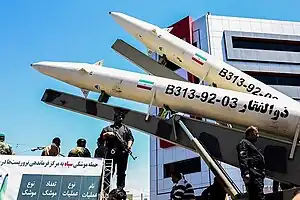| Zolfaghar | |
|---|---|
 Zolfaghar | |
| Type | SRBM[1] |
| Place of origin | Iran |
| Service history | |
| In service | 2017-present[1] |
| Production history | |
| Manufacturer | IRGC AF |
| Unit cost | $200.000 |
| Specifications | |
| Length | 10.3 m[1] |
| Width | 0.68 m[1] |
| Propellant | Single-stage Solid-propelled[1] |
Operational range | 700 km[1] |
Guidance system | INS, GPS[2] |
| Accuracy | 100 m CEP estimated[2] |
| References | |
The Zolfaghar (Persian: ذوالفقار) missile is an Iranian road-mobile,[2] single-stage, solid-propelled SRBM[1] named after Zulfiqar the sword of Ali ibn Abi Talib. It is believed to be derived from the Fateh-110 SRBM family[2] (possibly the Fateh-313 missile).[1] The Aerospace Industries Organization unveiled the. weapon in 2016.[3] It entered service in 2017.[1] It was first used in the 2017 Deir ez-Zor missile strike and was therefore one of the first used mid-range missiles since 30 years.[4]
Design
According to Iranian sources, the Zolfaghar missile has a length of 10.3m, a diameter of 0.68m, and a launch weight of 4615kg with a warhead weighing 590kg that is designed to separate in midcourse phase, making it more difficult to detect, track and intercept than unibody missiles like the 9K720 Iskander.[5]
History
It was first unveiled during a military parade aboard a vehicle decorated with an anti-Zionist banner[2] on 25 September 2016[1] after which Defense Minister Hossein Dehqan claimed that the missile had a range of 700 km.[1][2] The Iranian Ministry of Defense would later on release a video of its testing.[1] On 17 June 2017 Iran launched six Zolfaghar missiles into Syria towards the Deir ez-Zor region on ISIS targets as a response to the attack in Tehran on 8 June 2017.[1]
In February 2019 Iran unveiled a new longer range version of the Zolfaghar missile called the Dezful missile with a range of 1000 km, this is an MRBM.[6]
On 7 March 2021, Yemeni Houthi attacked different locations in Saudi Arabia with ballistic missiles and armed drones with a Zolfaghar ballistic missile along with several Samad-3 loitering munitions targeted the Aramco oil facilities at Ras Tanura.[7][8]
Operators
State-operators
Reported future operators
 Russia – An intelligence assessment shared in October 2022 with Ukrainian and U.S. officials contended that Iran’s armaments industry was preparing a first shipment of Fateh-110 and Zolfaghar missiles to Russia.[10] Western media reported the sale was confirmed by the Iranian side later in October.[9] Iran rejected the Western "media hype" over the delivery of Iranian missiles to Russia. The foreign minister said that "what they have said about the missiles is completely wrong."[11]
Russia – An intelligence assessment shared in October 2022 with Ukrainian and U.S. officials contended that Iran’s armaments industry was preparing a first shipment of Fateh-110 and Zolfaghar missiles to Russia.[10] Western media reported the sale was confirmed by the Iranian side later in October.[9] Iran rejected the Western "media hype" over the delivery of Iranian missiles to Russia. The foreign minister said that "what they have said about the missiles is completely wrong."[11]
See also
References
- 1 2 3 4 5 6 7 8 9 10 11 12 13 "Zolfaghar". Missile Threat. Archived from the original on 2020-02-18. Retrieved 2017-06-20.
- 1 2 3 4 5 6 "Zolfaghar". Missile Defense Afvocacy Alliance. Archived from the original on 2020-03-30.
- ↑ Staff. (25 September 2016). "Iran unveils Zulfaghar long-range ballistic missile". Mehr News Agency website Retrieved 20 March 2022.
- ↑ "Iran Fires at Militants in Syria in First Use of Mid-range Missiles in 30 Years". Haaretz. 18 June 2017. Archived from the original on 18 June 2017. Retrieved 18 June 2017.
- ↑ "The Iranian Missile Threat". www.csis.org. Retrieved 2022-10-20.
- ↑ "Report: Iran Inaugurates Medium-Range Ballistic Missile". New York Times. Associated Press. 2019-02-07. ISSN 0362-4331. Archived from the original on 2019-02-09. Retrieved 2019-02-08.
- ↑ "World News | Latest Top Stories". Reuters.
- ↑ "Ansarullah's missile and munitions launches flex Saudi responses".
- 1 2 Altman, Howard. "Ukraine Situation Report: Iranian Officials Admit To Selling Russia Ballistic Missiles (Updated)". thedrive.com. The Drive. Retrieved 19 October 2022.
- ↑ "Iran plans to send missiles, drones to Russia for Ukraine war, officials say". Washington Post. ISSN 0190-8286. Retrieved 2022-10-16.
- ↑ "Update: Iranian FM acknowledges sending drones to Russia before Ukraine conflict-Xinhua". english.news.cn. Retrieved 2022-11-12.
